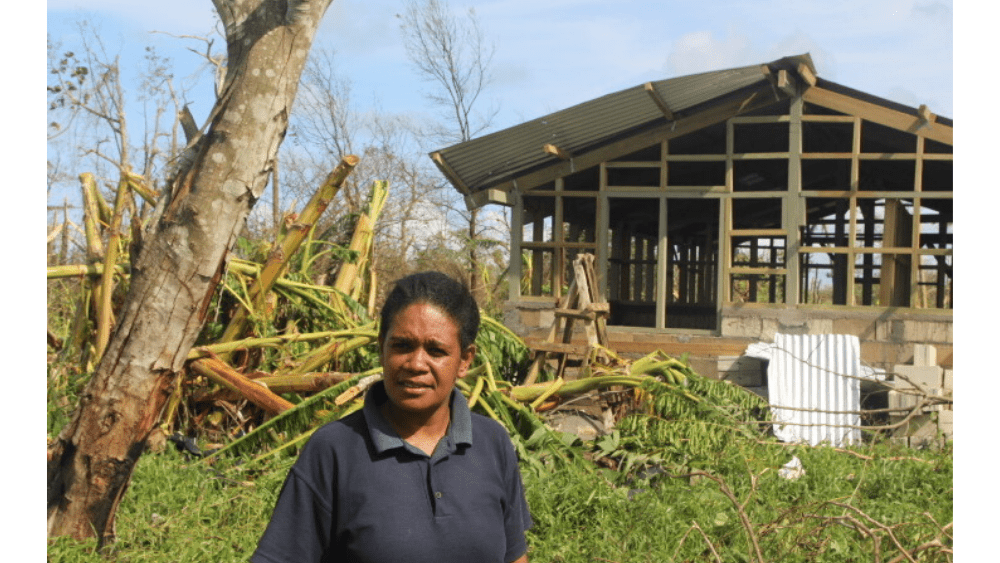Aussie Christians called to weekly prayer for cyclone ravaged Vanuatu
President of the Uniting Church in Australia, Dr Deidre Palmer, has asked for Uniting Church members to pray at 9am every Wednesday for “our Pacific brothers and sisters” affected by last week’s tropical cyclone Harold.
Her call is a response to a request from the Presbyterian Church of Vanuatu, which the UCA partners with.
“May God sustain our Pacific partner churches with strength, wisdom, compassion and hope …” Deidre Palmer
“I encourage Uniting Church members to pray for all those impacted by Cyclone Harold, and that particularly as the threat of the coronavirus looms, that recovery efforts can be sustained to people left homeless and without access to food or water,” said Dr Palmer.
“May God sustain our Pacific partner churches with strength, wisdom, compassion and hope, as they embody the gospel of Christ at this difficult time.”
UnitingWorld shared a report from its International Programs Manager Aletia Dundas that the greatest damage in Vanuatu has been to the islands of Santo, Ambae, Pentecost and parts of the Malekula Islands.
“Our partner, the Presbyterian Church of Vanuatu (PCV), initially lost touch with colleagues but has since learnt of the devastation in Santo.” Aletia reported.
“There has been roof and likely equipment damage to the eye clinic and significant damage at the Talua Theological Training Institute, forcing the college to close until repairs can be done.
“Availability of food and access to clean water are the immediate concerns.”
Cyclone Harold’s path of destruction
More than a week after Harold tore through Vanuatu, the extent of its devastation is becoming clear. New concerns about delivering aid to affected areas are emerging.
Sweeping through Vanuatu, the Solomon Islands and Fiji last Monday, the storm killed dozens of people and left around 150,000 Pacific Islanders without shelter and with limited food supplies. Harold brought winds of up to 250 kilometres per hour and flooding rains that devastated buildings, crops and infrastructure, including vital hospitals and health centres.
Emergency shelters are the initial priority aid need, for the region.
Arial assessments of Vanuatu’s second-largest town, Luganville, indicate around 65 per cent of all buildings are estimated to have been destroyed, with a further 25 per cent damaged. Roads, communication networks and electricity impacted by the disaster may take as long as up to 12 months to fully restore. Significant damage to crops and gardens will affect the livelihoods of several thousand people who rely on small-scale agriculture, either as their main income or food.
World Vision’s Vanuatu country director Kendra Derousseau says emergency shelters are the initial priority aid need for the region. Food and water are a close second, with most people’s supplies set to last until the end of this week.
Derousseau says the crisis could not have come at a worse time for Vanuatu, with the country’s tourism industry – 40 per cent of its GDP – shut down by strict border measures to protect against COVID-19. While there are no confirmed cases in Vanuatu, all international travel to the country has been prohibited. In addition, all cargo brought to Vanuatu as aid requires a mandatory period of quarantine and/or decontamination measures, causing a necessary delay in getting it to those who need it.
Delivery of Australian Aid
The Australian Government has approved a $4 million package to respond to Tropical Cyclone Harold in Vanuatu, which includes: $1 million for humanitarian supplies and logistics support; $1.5 million to support Government of Vanuatu systems; $100,000 to support release of pre-positioned supplies; and $1.4 million to be delivered through the Australian Humanitarian Partnership.
On Sunday, a Royal Australian Air Force plane, loaded with supplies including shelter kits, kitchen kits, blankets, solar lanterns, bed nets and hygiene kits, was unable to land in Vanuatu (due to scheduling conflicts on the tarmac). On Monday, the delivery was made successfully.
“Australia has complied with strict COVID-19 protocols,” reported the Australian High Commission in Vanuatu. “Australian Defence Force personnel supporting the delivery of these essential supplies adopted additional measures including wearing Personal Protective Equipment, providing medical clearances, disinfecting equipment and supplies, and practicing physical distancing at all times.”
World Vision Vanuatu is solely grant-funded, with programs backed by the Australian (DFAT) and New Zealand governments (MFAT), as well as UN agencies such as UNFPA and Unicef – and direct funding from the Vanuatu government.
Along with emergency shelter, World Vision Vanuatu aims to reach 3000 households (15,000 people) with: jerrycans and water purification tabs with appropriate hygiene promotion messages; and gender-sensitive hygiene kits with extra provisions for people with disabilities to manage menstruation – and also for people who experience incontinence.
In addition, World Vision supports local networks to deliver gender-based violence safety-planning and support services, plus supporting Disability People’s Organisations to conduct rapid assessments, outreach activities and contextualised, adjusted responses to people with disabilities.
Pray
Some prayer points to help
Join with the Uniting Church of Australia members by praying for “our Pacific brothers and sisters at 9am every Wednesday, as requested by the Presbyterian Church of Vanuatu.



